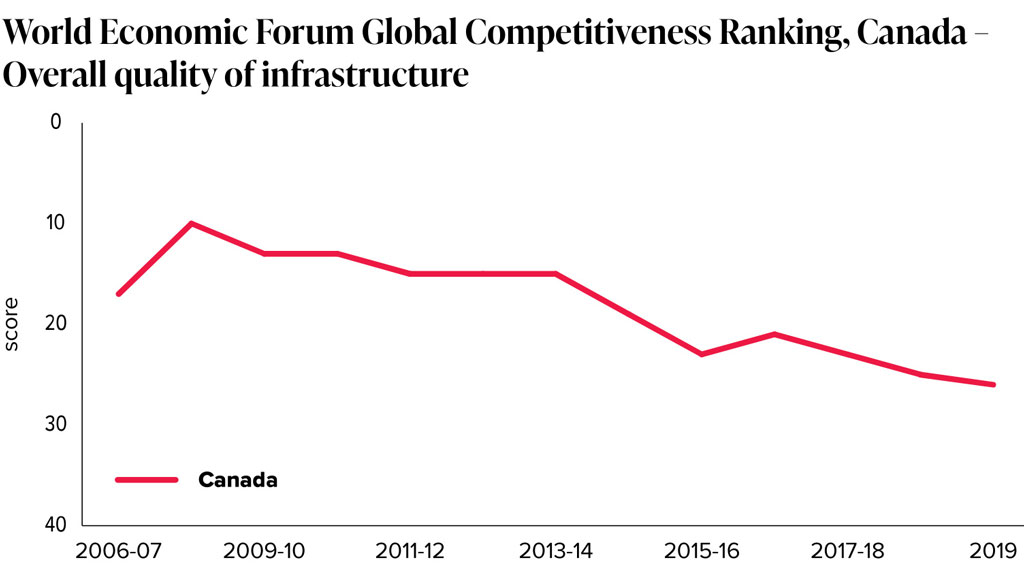A national plan for trade infrastructure is urgently needed if Canada wants to climb back up the world rankings and regain the confidence of foreign customers, states a new report from the Canada West Foundation (CWF), an independent, non-partisan public policy think-tank.
“The path to returning to the top 10 of global trade infrastructure rankings and restoring the confidence of foreign customers requires that, instead of ‘shovel ready,’ Canada institutionalize an ongoing intelligence-based national plan for its trade corridor infrastructure,” state the authors of the 38-page report.
“Drawing on the best features of already well-established national plans of competitor countries together with Canada’s own program, like the previous Asia-Pacific Gateway and Corridor Initiative and Transport Canada’s current Regional Transportation Assessments, offer Canada a shortcut back to trade infrastructure excellence.”

The report, From Shovel Ready to Shovel Worthy, was supported by the Canadian Construction Association (CCA) and Western Canada Roadbuilders and Heavy Construction Association and other organizations.
The report suggests it is vital for Canada to move from quick fixes to a strategy that focuses on long-term solutions as the country’s global trade infrastructure rankings have been in decline for more than 10 years.
From 2009 to 2019, confidence in the country’s infrastructure fell from 10th to 26th globally.
Canada needs to follow the successful path taken by its competitors and lay the foundations, structure and institutions to replace unco-ordinated shovel-ready decisions with a shovel-worthy national trade infrastructure plan as the default framework to guide the decision-making, the report states.
Carlo Dade, director of the trade and investment centre at the CWF and co-author of the report, says a new public-private body should be established to oversee the trade infrastructure blueprint and ensure it complements the country’s climate change goals and criteria to meet the needs of marginalized communities.
“We need a new public-private body that has true independence from government so it can exist outside the political cycles. No politician wants to be told what they can and can not fund. But you really do need to make decisions that are in the national interest. You do need to have the same capacity that our competitors do to focus on longer-term issues.”
Dade maintains decisions about trade infrastructure should not be left in the hands of politicians because they are often more concerned about announcing projects to score political points than investing properly.
“If you want to do climate change, lower GHGs and have resiliency, it can’t be the political flavour of the month. It’s got to be concrete. It’s got to be long-term and it’s got to be serious. You only get that if you put it in something that exists outside of the news cycle and something that exists outside of the political cycle.”
For Dade, a solid national trade infrastructure plan is important because it affects the everyday lives of Canadians.
“There’s the infrastructure that Canadians want, hockey rinks, ballparks. There’s infrastructure that Canadians need, hospitals, schools, green infrastructure, and then there’s the infrastructure that pays for what we want and what we need. So, if you don’t get this right, then the other things that we want, the things that contribute to quality of life, the things that we need just to live, get more precarious and more difficult.”
In an earlier federal election, Dade says Prime Minister Justin Trudeau talked about spending on infrastructure but much of it turned out to be social and green infrastructure and trade infrastructure was ignored.
“There was a lot of yelling and screaming nationally for the government to finally deal with trade infrastructure,” he says. “This is important because it touches and enables everything that people want but it’s also important because we have a real window where the government has turned its attention to this.”
The CCA and several construction organizations in Western Canada have endorsed the idea of an independent body.
“It is vital that we scale up our trade infrastructure now to build supply chain capacity, support green innovation and emerging technologies, and fuel our global competitiveness,” says CCA president Mary Van Buren.
Western Canada Roadbuilders and Heavy Construction Association president Chris Lorenc touted the importance of moving away from sporadic, short-term investments in trade transportation networks, as it is fundamental to moving Canada to new and expanded global trade and ensuring economic stability and growth.
Both the Saskatchewan Heavy Construction Association (SHCA) and Alberta Roadbuilders and Heavy Construction Association noted the importance of having a solid plan in place for Canada’s trade infrastructure.
“As a trading nation, Canada’s success is closely linked with the strength and competitiveness of our multi-modal transportation systems and key trade corridors,” noted SHCA president Shantel Lipp. “Saskatchewan and the West produce much of what the world needs.”
Kelly Scott, president of the BC Roadbuilders and Heavy Construction Association, says its important to take a long-term view of trade infrastructure needs.
“Our infrastructure problems go deeper than responding to the latest slide or flood. Unless we get the basis for decision-making down, including factoring in climate change issues, we’re always going to risk making sub-optimal decisions.”






Recent Comments
comments for this post are closed